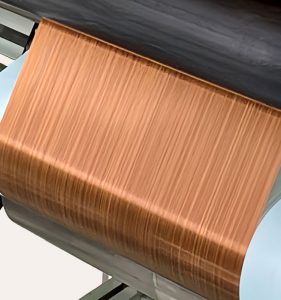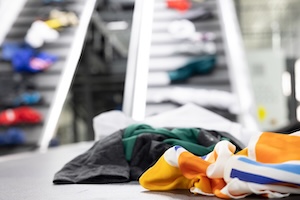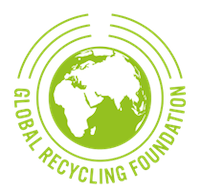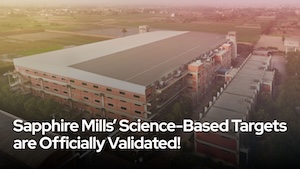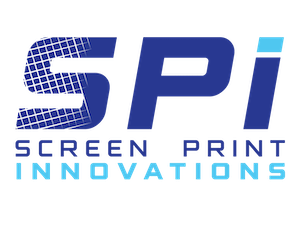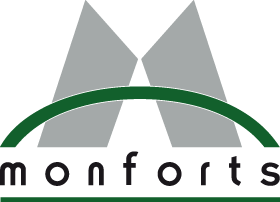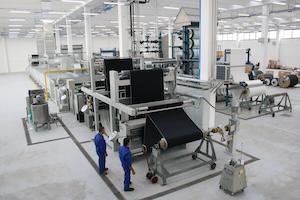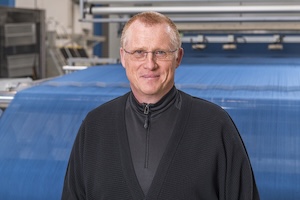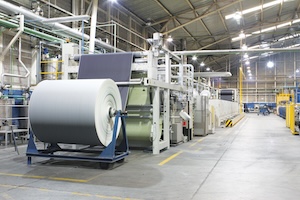 KENNESAW, Ga. — March 25, 2025 — CORDURA® Advanced Fabrics will exhibit an extensive collection of certified fabrics during Functional Fabric Fair Spring, April 14-16, 2025, at the Oregon Convention Center in Portland, Ore. Attendees can stop by the CORDURA Advanced Fabrics booth #1212 and 20 CORDURA authorized mill partners’ booths for a one-stop shopping experience.
KENNESAW, Ga. — March 25, 2025 — CORDURA® Advanced Fabrics will exhibit an extensive collection of certified fabrics during Functional Fabric Fair Spring, April 14-16, 2025, at the Oregon Convention Center in Portland, Ore. Attendees can stop by the CORDURA Advanced Fabrics booth #1212 and 20 CORDURA authorized mill partners’ booths for a one-stop shopping experience.
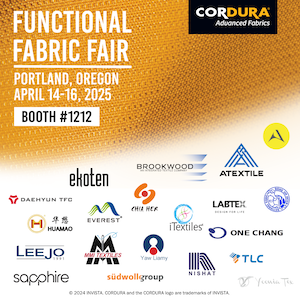 “Both our presence and our mill partners’ presence at the Functional Fabric Fair continues to expand,” said Cindy McNaull, CORDURA Brand Business Development director. “Our team along with our valued CORDURA Neighborhood mill partners are thrilled to showcase a vast array CORDURA Advanced Fabrics, including a special spotlight of over 100 ‘What’s New’ fabric innovations.”
“Both our presence and our mill partners’ presence at the Functional Fabric Fair continues to expand,” said Cindy McNaull, CORDURA Brand Business Development director. “Our team along with our valued CORDURA Neighborhood mill partners are thrilled to showcase a vast array CORDURA Advanced Fabrics, including a special spotlight of over 100 ‘What’s New’ fabric innovations.”
Additionally, CORDURA Advanced Fabrics is giving away a Granite Gear Starter Pack crafted with durable CORDURA Advanced Fabric. Elevate your adventures with gear tougher than granite by entering through the form on its website, or in person at booth #1212 until April 16, 2025. Ask the team about the CORDURA Fabric Finder where you can efficiently navigate, explore and order samples.
Read more about the CORDURA Neighborhood of 20 authorized mill partners and their specialties featuring CORDURA Advanced Fabrics — all available at Functional Fabric Fair Spring 2025:
- ARTMILL BY ARTISTIC MILLINERS PVT. LTD (Booth #1021) – Pakistan. Specializes in CORDURA Denim and CORDURA NYCO Fabrics. ArtMill is set to bring their latest innovations in functional fabrics, designed to enhance comfort, durability and sustainability without compromising on style. Their responsible approach includes recycled fibers and reduced water processing. As part of Artistic Milliners, ArtMill develops high-performance textiles with features like moisture-wicking, water resistance, thermal regulation and enhanced abrasion resistance. Designed for versatility across fashion, activewear and workwear, ArtMill’s fabrics offer comfort, flexibility and longevity.
- ATEXTILE (Booth #1216) – China. Specializes in CORDURA UltraLite Fabric, CORDURA Ballistic Fabric, CORDURA Classic Fabric, CORDURA re/cor™, CORDURA HP Fabric, CORDURA Lite Fabric and CORDURA Naturalle Fabric. Atextile has been a leading manufacturer of high-quality fabrics for over 20 years, offering a diverse range of fabrics suitable for workwear, outerwear, motorcycle gear, bags/packs and footwear applications. With options like heat transfer, digital, rotary screen and reflective printing, alongside new state-of-the art lamination capability, Atextile provides customizable fabric solutions with a strong focus on durability and performance. They also specialize in blends of CORDURA® fabrics with stretch, creating soft, comfortable and durable fabrics.
- BROOKWOOD COMPANIES, INC. (Booth #401) – United States. Specializes in CORDURA Classic Fabric and CORDURA Truelock™ Fabric. Brookwood Companies, Inc. provides a wide range of technical synthetic fabrics to a number of industries around the world. As an integrated textile company with a focus on research and development, Brookwood has been a long-standing CORDURA partner mill and a trusted leader in providing innovative and diverse solutions to a growing list of customers. Brookwood Companies, Inc. is uniquely positioned to provide their customers support at every step, with strong, high quality, cost-effective solutions. It has established capabilities in development and manufacturing, as well as access to a global network of marketing and manufacturing partners, and a robust roll-goods program.
- CHIA HER (Booth #1602) – Taiwan. Specializes in CORDURA NYCO Fabric, CORDURA Naturalle Fabric and CORDURA Combat Wool™ Fabric. They offer a wide range of textile processes including wool/cotton and nylon/cotton spinning, twisting, weaving, dyeing, printing, coating, laminating and specialty finishings. With decades of experience and expertise in yarn-dyed pattern design, Chia Her has established themselves as a leader in the field. Their commitment to innovation and value-added products has earned them partnerships with global leading brands in the outdoor, workwear, sports and fashion industries as they continue to develop cutting-edge solutions for their client’s diverse needs.
- DAEHYUN TFC (Booth #1809) – South Korea. Specializes in CORDURA Naturalle Fabric, CORDURA Lite Fabric, CORDURA Ballistic Fabric, CORDURA re/cor™, CORDURA Classic Fabric and CORDURA HP Fabric. DAEHYUN TFC is a growing company renowned for their world-class technology and production. With a focus on becoming a top-tier material company for equipment, apparel, workwear and advanced materials, DAEHYUN TFC emphasizes continuous innovation and global competitiveness. Since 1973, they have consistently expanded their capabilities, positioning themselves as a leading-edge materials company in the 21st century. DAEHYUN TFC aims to maintain their position as a global leader in textiles and materials through ongoing innovation.
- DONG JIN (Booth #1636 ) – South Korea. Specializes in CORDURA Ultralite Fabric, CORDURA Lite Fabric, CORDURA Ballistic Fabric, CORDURA re/cor, CORDURA Classic Fabric, CORDURA HP Fabric, CORDURA TrueLock™ Fabric and CORDURA Hi-Vis Fabric. Dong Jin is a leading fabric manufacturer, specializing in Nylon and Polyester fabrics with specialty coatings. They also offer waxed fabrics with unique washing characteristics. These innovations can also be married with special coatings. As a long-standing partner of INVISTA, Dong Jin has a strong track record of creating cutting-edge woven developments for Outdoor, Bags/Packs, Sports, Military/Tactical and Workwear industries. An early adopter of CORDURA re/cor RN66, they offer a wide range of fabric constructions to choose from, including CORDURA re/cor™ RN6 liners that can be combined with its CORDURA re/cor RN66 base fabrics.
- EKOTEN TECHNIC (Booth #600) – Turkey. Specializes in CORDURA NYCO Knit, CORDURA Naturalle Knit and CORDURA Combat Wool Knit fabrics. Ekoten Technic, based in Izmir, Turkey, produces responsible and functional fabrics for the sportswear industry. They use advanced technology, research and development to create their products in a responsible manner. With a daily production capacity of 50 tons for both knitting and dyeing, Ekoten Technic utilizes 31 jet and 2 cold-pad batch dyeing machines and boasts an extensive catalog of over 30,000 registered fabrics. It specializes in the activewear and technical markets, with a wide variety of constructions, different fiber compositions and performance characteristics.
- EVEREST TEXTILE CO. LTD. (Booth #1314) – Taiwan. Specializes in CORDURA® Naturalle Fabric. Founded in 1988, Everest Textile is the first vertically integrated textile manufacturer in Taiwan, with capabilities in yarn texturizing, weaving, knitting, dyeing, post-finishing (including printing, coating, laminating) and garment production. Everest develops and supplies high value-added and innovative products to global leading brands in sports, outdoor, city, casual, medical and industrial materials. It prides itself on efficiency and sustainable fabrics. It has four fabric factories, one garment factory and eight offices globally.
- HUAMAO (XIAMEN) SPECIAL MATERIALS CO. (Booth #1534) – China. Specializes in CORDURA Naturalle Knit, CORDURA Naturalle Fabric, CORDURA Lite Fabric, CORDURA re/cor, CORDURA Classic Fabric, CORDURA HP Fabric, CORDURA UltraLite Fabric and CORDURA Hi-Vis Fabric. Huamao Group has been one of leading functional synthetic fabrics factories in China for more than 30 years. Their capabilities include ATY yarn, weaving, dyeing, coating, laminating, digital printing and more. It was the first Bluesign® partner in China, and is the largest OEKO-TEX® and GRS certified CORDURA Advanced Fabrics partner. HuaMao will also be opening a new facility in Vietnam in 2026.
- ITEXTILES® Pvt. Ltd. (Booth #1213) – Pakistan. iTextiles® is a multi-disciplinary textile solutions company, managing and innovating the entire value chain in performance textiles. Since 2006, they have evolved from a fiber trading company to a leading value chain manager, supplying raw materials and representing top global brands. iTextiles® specializes in R&D, sourcing, branding and manufacturing responsible, high-performance fibers and fabrics for fashion, workwear, military and home textiles. Their solutions ensure comfort and durability — driving innovation forward.
- LABTEX (Booth #914) – Taiwan. Specializes in CORDURA Naturalle Fabric and CORDURA Naturalle Knit. Labtex operates from offices in Taipei, Taiwan, and Shanghai, China, and focus on providing innovative fabrics for the outdoor, fashion and sportswear markets. Labtex recognizes the significance of consistent quality, competitive pricing, timely delivery and excellent customer service in the outdoor and fashion industries and strives to meet these requirements.
- LEEJO (Booth #1717) – South Korea. Specializes in CORDURA Ultralite Fabric, CORDURA Lite Fabric, CORDURA Ballistic Fabric, CORDURA re/cor, CORDURA Classic Fabric, CORDURA Truelock CORDURA HP Fabric, CORDURA NYCO Fabric and CORDURA® Naturalle Fabric. LEEJO Textile is a premier global fabric supplier with over 30 years of experience specializing in high-quality fabrics for the fashion, sports and outdoor industries. With facilities in both Korea and China, they ensure efficient production and strict quality control throughout the manufacturing process. LEEJO Textile is known for their expertise in performance fabrics and proudly hold certifications such as Bluesign®, OEKO-TEX, GRS and HIGG Index, underscoring their commitment to environmental responsibility and maintaining exceptional quality standards.
- MMI Textiles (Booth #1605) – United States. Specializes in CORDURA TrueLock Fabric. MMI Textiles is a premier supplier with a commitment to unmatched service and integrity. It offers solutions such as fabrics, webbing, binding tape, hook & loop, hardware, labels and more. It proudly holds certifications such as OEKO-TEX, Bluesign, GRS (Global Recycle System), HIGG INDEX standards and Clean by Design project and ONECHANG.
- NISHAT MILLS LTD. (Booth #1215) – Pakistan. Specializes in CORDURA NYCO Fabric and CORDURA Classic Fabric. Nishat Mills Ltd., based in Lahore, Pakistan, stands as one of the largest and most modern vertically integrated textile companies in the country. With a monthly production capacity exceeding 6 million meters, they specialize in producing woven piece dye fabrics. Nishat Mills Ltd. offers a wide range of Cotton and Cotton blends, including blends with Nylon 66, Poly, Tencel™, Modal, Bamboo, Organic Cotton, Hemp, Linen, Cashmere, Wool and more. Their latest Nishat x CORDURA Capsule collection is a shining example of the breadth and depth of their durable fabric portfolio.
- ONE CHANG MATERIAL CO., LTD. (Booth #1707) – South Korea. Specializes in CORDURA Ultralite Fabric, CORDURA re/cor RN66, and CORDURA Naturalle Fabric. ONECHANG is a pioneer and leader in the global fashion market. It has grown to become a fashion field manufacturing and trading company, running a large facility with highly experienced manpower since 1976. With product assurance system satisfying OEKO-TEX, BLUESIGN, GRS, HIGG INDEX standards and Clean by Design project, ONECHANG pursues the improvement of society and the environment.
- SAPPHIRE FINISHING MILLS LTD. (Booth #1220) – Pakistan. Specializes in CORDURA NYCO Fabric and CORDURA Classic Fabric. With a focus on versatility, Sapphire Finishing Mills Ltd. offers a comprehensive fabric portfolio catering to various market segments. Their range includes functional fabrics for fashion, workwear, FR, tactical, military and casual/urban outdoor applications. As an integral part of the Sapphire Group, Sapphire Finishing Mills Ltd. is one of the largest fabric processing houses in the region, with a monthly capacity of 6 million meters. Responsibility and innovation are at the core of their offerings, as they collaborate closely with development partners to deliver dependable solutions for the apparel industry across a wide range of products.
- SUEDWOLLE GROUP GMBH (Booth #317) – Germany. Südwolle Group specializes in crafting high-quality yarns, primarily made from wool and other natural and sustainable materials, catering to a wide range of applications. Committed to excellence, it produces durable, premium products that inspire pride and passion. By championing responsible production and transparent supply chains, it strives to counter the fast fashion trend and reduce waste. Driven by innovation and sustainability, it is dedicated to shaping the future of textiles.
- TIONG LIONG INDUSTRIAL CO. LTD. (Booth #1221) – Taiwan. Specializes in CORDURA re/cor RPET, CORDURA AFT Fabric and CORDURA HP Fabric for footwear and gear end-uses. Tiong Liong Industrial Co. has nearly 50 years of experience in performance textiles, with a focus on eco-friendly processing techniques and smart manufacturing. With manufacturing in both China and Vietnam, Tiong Liong can provide faster and more agile localized production.
- YAW LIAMY (Booth #1321) – Taiwan. Specializes in CORDURA Lite Fabric, CORDURA Ballistic Fabric, CORDURA re/cor, CORDURA Classic Fabric, CORDURA HP Fabric and CORDURA TrueLock Fabric. With a rich history spanning over 40 years, Yaw Liamy operates from their base in Taiwan with a strong focus on innovation, research and development and service orientation. They are committed to delivering efficient services that foster growth opportunities and pride themselves on being a vertically integrated company, encompassing dyeing, printing and coating processing. To stay well-informed and in sync with global trends, Yaw Liamy has established branch offices in Hong Kong and China. This strategic move enables them to swiftly gather comprehensive market information, ensuring they stay in tune with the latest industry dynamics and popular trends worldwide.
- YOONIA TEX CO. LTD (Booth #1916) – South Korea. Specializes in CORDURA® NYCO Fabric, CORDURA NYCO Knit Fabric and CORDURA Naturalle Fabric. YOONIA TEX was established in 1992 in Seoul, Korea. Their mils are in Daegu, Korea, and offices are in Cipayung, Jakarta, and Vernon, CA, USA. YOONIA TEX is known for producing the finest circular knits, flat knits, fleece, print technology, warp knits and woven fabrics through rigorous quality checks. Their product innovation is known especially for activewear, athleisurewear and ready-to-wear fabric collections. YOONIA TEX holds certificates from OEKO-TEX and GRS. It is passionate about providing a ‘Customer First’ service experience.
Posted: March 26, 2025
Source: CORDURA® Advanced Fabrics – INVISTA



